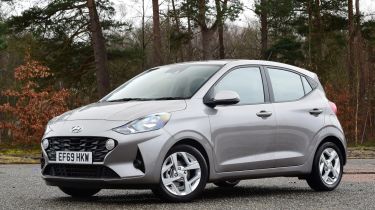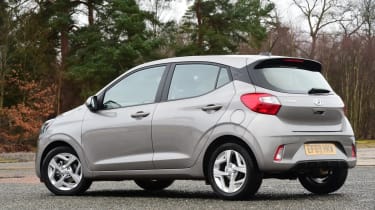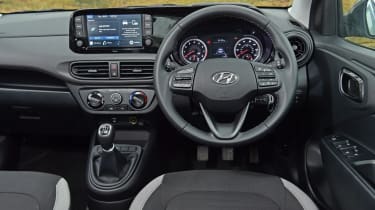Used Hyundai i10 (Mk3, 2020-date) review: one of the very best city cars
A full used buyer’s guide on the Hyundai i10 covering the i10 Mk3 that’s been on sale since 2020
Verdict
While the Hyundai i10 has long been one of our favourite small cars, the third take on the formula raises things to a whole new level in terms of quality, usability and sophistication. However, in order to achieve this, Hyundai has taken the i10 almost into supermini territory. This is still a small car, though; a Ford Fiesta is 40cm longer and 5.5cm wider, for example. The i10 also isn’t an especially cheap model considering its size, yet Hyundai has struck a good compromise between compact external dimensions and generous cabin space, while it has also come up with a good balance between small-car prices and big-car equipment levels. Sure, there are cheaper options out there, but when considering all-round usability, comfort and safety, it’s hard to think of a reason to not put the i10 on your shortlist.
City cars used to be cramped, basic, noisy, slow and out of their depth on long journeys, but the modern breed of tiny motors combines low running costs and excellent refinement with big-car comfort and safety tech. Throw in decent pace and compact dimensions that make parking easy, and there really isn’t much to dislike – yet city cars are an endangered species.
Used - available now
One of the few companies to stick with the sector is Hyundai, with its i10, which arrived in first-generation form in 2008.
We loved that car, and the Mk2 of 2014 was even better. When the i10 Mk3 arrived in 2020, we were even more impressed with its talents – and the good news is that it makes just as great a buy on the used market.
History
The i10 Mk3 arrived in January 2020, available only as a five-door hatchback. There was a choice of 66bhp three-cylinder 1.0-litre or 83bhp four-cylinder 1.2-litre petrol engines, both of which were available with five-speed manual or automated manual (automatic) gearboxes.
At first, there was a selection of just three trim levels: SE, SE Connect or Premium, with the first one available only with the 1.0-litre engine and a manual transmission. The others were offered with all combinations of the two powerplants and gearboxes.
In July 2020 an i10 N Line model was added to the range, with a 99bhp turbocharged 1.0-litre engine and sportier styling touches both inside and out. A facelift in April 2023 brought a refreshed design, improved connectivity, new colour options and extra safety equipment.
Which one should I buy?
The N Line is by far the most fun i10 to drive, but if your journeys are largely urban, the basic 1.0-litre engine is all you need; we’d opt for the 1.2, though, because the extra pep makes longer trips more relaxing.
Equipment levels are impressive; even the base SE has air-conditioning, Bluetooth, cruise control with speed limiter, a DAB radio, electric windows front and rear, electric door-mirror adjustment, high-beam assist, auto emergency braking and a multi-function steering wheel. The SE Connect adds an eight-inch touchscreen, 15-inch alloy wheels, Android Auto and Apple CarPlay, voice control and a rear camera.
The range-topping i10 Premium comes with 16-inch alloys, heating for the steering wheel and front seats, projector headlights, privacy glass and classier interior trim.
Alternatives to the Hyundai i10
The Kia Picanto shares a lot with the Hyundai, because the two companies are linked. Just like the i10, the Picanto offers reasonable value and comes with a long warranty, plus it has plenty of big-car features. Reliability is another of its strong suits. The Volkswagen up! moved the city car game on in 2011, and it’s still desirable, just like its Skoda Citigo and SEAT Mii cousins. However, the latter two have been offered in electric form only since the end of 2019.
The Citroen C1, Peugeot 108 and Toyota Aygo are related to each other, and while not as roomy as the i10, there are plenty on the used market, plus purchase and running costs are low. Fiat’s 500 still looks stylish and is plentiful, but it’s cramped inside.
What to look for
Going spare
All i10s came with a tyre-repair kit instead of a spare wheel. Space-saver spare rims are available from £100 or so online.
Reliability
This car is proving to be very reliable. Any problems should be fixed by dealers; new i10s come with a five-year unlimited-mileage warranty.
Safety
The i10 managed three stars out of five in Euro NCAP’s hands. It fared well in crash tests, but some safety kit was lacking on the cheaper models.
Hi-tech
The i10 Premium and N Line were available with a Tech Pack, which improved connectivity and linked the phone and car via an app.
Interior
The i10 might be Hyundai’s smallest car, but that isn’t given away by the dashboard, which has a big-car feel with its large touchscreen display, plenty of standard equipment and a good level of fit and finish. The base SE model does without the display, but there aren’t many of these on the used market.
There’s plenty of head and legroom for two adults if they’re not too tall, and while you can fit three people in the back, on a long journey they’ll probably find things a bit cramped. The ample cabin space doesn’t mean a small boot, because it measures a very class-competitive 252 litres with the back seats in place. This jumps to 1,050 litres with the second row folded down.
Prices
Shop around, because values are erratic, and you might get significantly more for your money if you do your research. The smaller engine accounts for three quarters of the cars available, while one in five i10s has an automatic transmission.
SE Connect is the most popular trim, accounting for 40 per cent of the cars available. Next is Premium (almost 30 per cent), then the N Line with 25 per cent.
To check prices on a specific model head over to our valuation tool.
Running costs
All i10s are recommended to be serviced every year or 10,000 miles, whichever comes first. The initial six services are pegged at £234-£474, but once the five-year warranty has expired, you can take advantage of Hyundai’s three-tier eSENSEtials programme. The cheapest (Base) is little more than an oil and filter change along with any software updates.
The next level up is Core, at £129; over the Base service you’ll have a new air filter, as well as fresh brake and clutch fluid.
The most costly package is the £219 Full, which adds new spark plugs and pollen filter, as well as replacement coolant and gearbox oil. Because both engines are chain driven there are no cambelts to replace, which helps to shave running costs a little.
Driver Power owner satisfaction
The i10 made its Driver Power debut in our 2020 new-car survey, in 39th place out of 75. It dropped to 45th in 2021, and 62nd in 2022, but it didn’t feature in the 2023 survey; it has never appeared in our used-car polls. In the 2022 survey the i10 scored well for value, fuel economy, reliability and ergonomics, and impressively, it came first for navigation. But in many other areas the i10 was rated very poorly.
Looking to sell your current car quickly and for a good price? Try our Free Car Valuation tool today!















